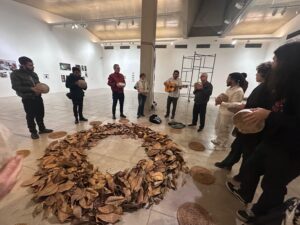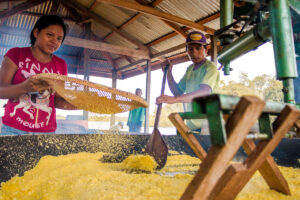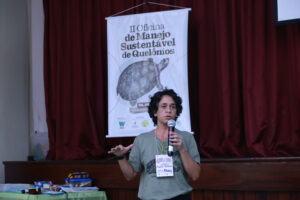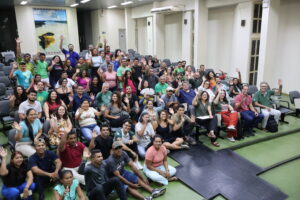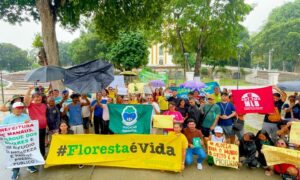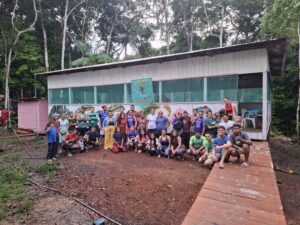Event in Brasília brought together fishing communities, scientists, and managers to discuss participatory fisheries management and socio-environmental justice; Instituto Juruá was present with technicians and collaborating fishermen
By Raphael Chicayban
Translated by Monique Oestreicher
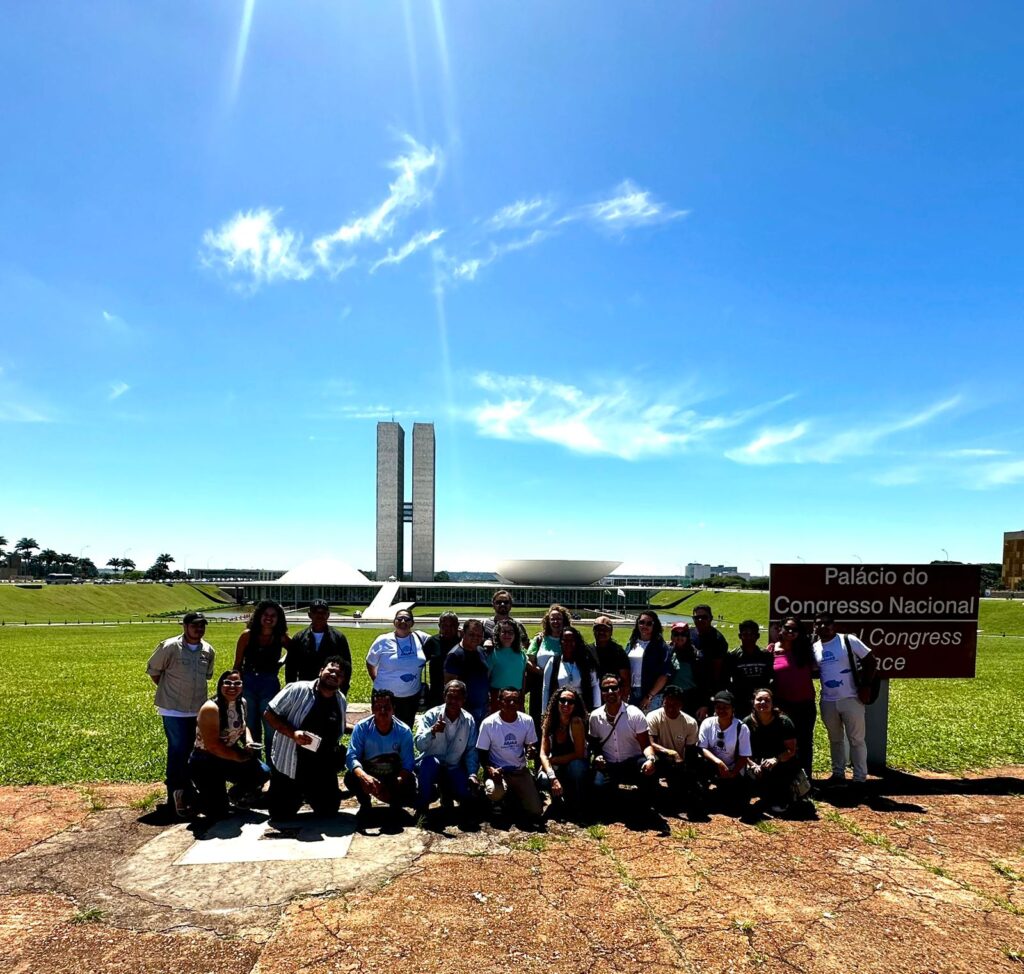
From February 3 to 6, 2025, Brasília hosted a historic gathering for Amazonian fishing communities. The event, Dialogues of Knowledge: Practices for Advancing Participatory Fisheries Management in the Brazilian Amazon, was organized by the Amazon Waters Alliance and the Wildlife Conservation Society (WCS). It brought together fishermen, community leaders, scientists, public managers, and representatives of civil society organizations in a collective effort to strengthen fisheries governance and secure the rights of water peoples. Instituto Juruá participated in the event with Eduardo von Muhlen, coordinator of the Territorial Governance and Socio-bioeconomy front, and José Alves de Moraes “Silas,” a community management specialist who also represented the Association of Agro-extractive Residents of Baixo Médio Juruá (AMAB).
Also attending from the Médio Juruá region was Francisco das Chagas Melo de Araújo, known as “Seu Preto,” a representative of the Association of Agro-extractive Residents of the Uacari Sustainable Development Reserve (AMARU). With vast experience in fisheries management and traditional knowledge, he contributed to discussions. This event, previously held in countries such as Colombia and Peru, arrived in Brazil with the goal of integrating traditional and scientific knowledge, promoting an exchange of experiences, and building strategies to defend fishing territories and traditional ways of life.
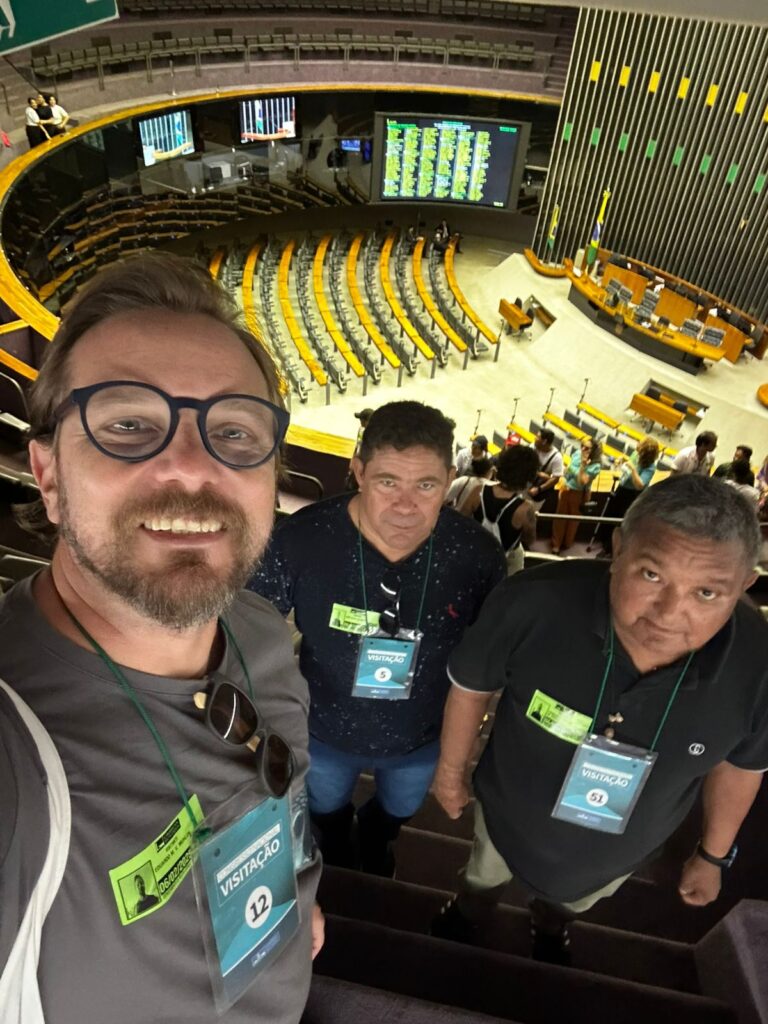
The initiative is part of a broader effort by the Amazon Waters Alliance to support regional fisheries governance, tackling challenges such as pressure on natural resources, lack of land regularization, and excessive bureaucracy in accessing public policies.
The Brasília Charter: A Manifesto for Socio-environmental Justice
One of the most significant outcomes of the event was the drafting of the Brasília Charter, a document summarizing the demands and proposals of fishing and traditional communities. Addressed to the Brazilian state, government agencies, and civil society, the charter serves as a manifesto of resistance and a call to action.
The document denounces increasing pressure on fishing community territories, highlighting the importance of popular mobilization to prevent setbacks and advance the fight for dignity and recognition. Key demands include land regularization, access to the Registro Geral da Pesca (RGP, General Fishing Registry), and the implementation of public policies to ensure food sovereignty and mitigate the socio-environmental impacts caused by large-scale projects.
Regarding the challenges faced by communities, Eduardo von Muhlen emphasized:
“The lack of land regularization is a historical problem that makes communities very vulnerable. Without legal recognition of their territories, they are exposed to invasions, land grabbing, and large enterprises like hydroelectric dams and mining operations, which threaten not only the environment but also their way of life. The RGP, which recognizes fishermen and fisherwomen, faces numerous bureaucratic obstacles. Many report difficulties in obtaining the registry, the process is slow, and many indigenous and fishing communities are left out. This directly impacts people’s daily lives because, without the RGP, they cannot access important public policies, such as the Seguro Defeso (closed-season insurance) and other social benefits.”
The charter strongly criticizes the precariousness and lack of transparency in the RGP, an essential tool for legally recognizing artisanal fishermen. Outdated records, excessive bureaucracy, and difficulties in accessing the registry directly affect these communities, preventing them from securing fundamental rights such as the Seguro Defeso and other social security benefits.
Dialogues and Advocacy: The Fishermen’s Voice in Brasília
The event was structured around three main axes: dialogue, training, and advocacy. On the first day, participants shared experiences and best practices in participatory fisheries management, mapping successful initiatives and identifying common challenges. Representatives from organizations such as the Pastoral Council of Fishermen (CPP) and the Pirarucu Collective emphasized the importance of integrating traditional and scientific knowledge to conserve fishery resources.
Seu Preto, representing AMARU, shared his impressions:
“My trip to Brasília was extremely important. The institute took me there to defend my territory and contribute to our struggle. I learned a great deal, was well received and respected, and we had three days of productive discussions. From the beginning, we led the meeting’s agenda, defining what we needed to discuss and formalizing our statements for the Ministry of Fisheries, the Secretary of the Environment, and IBAMA.”
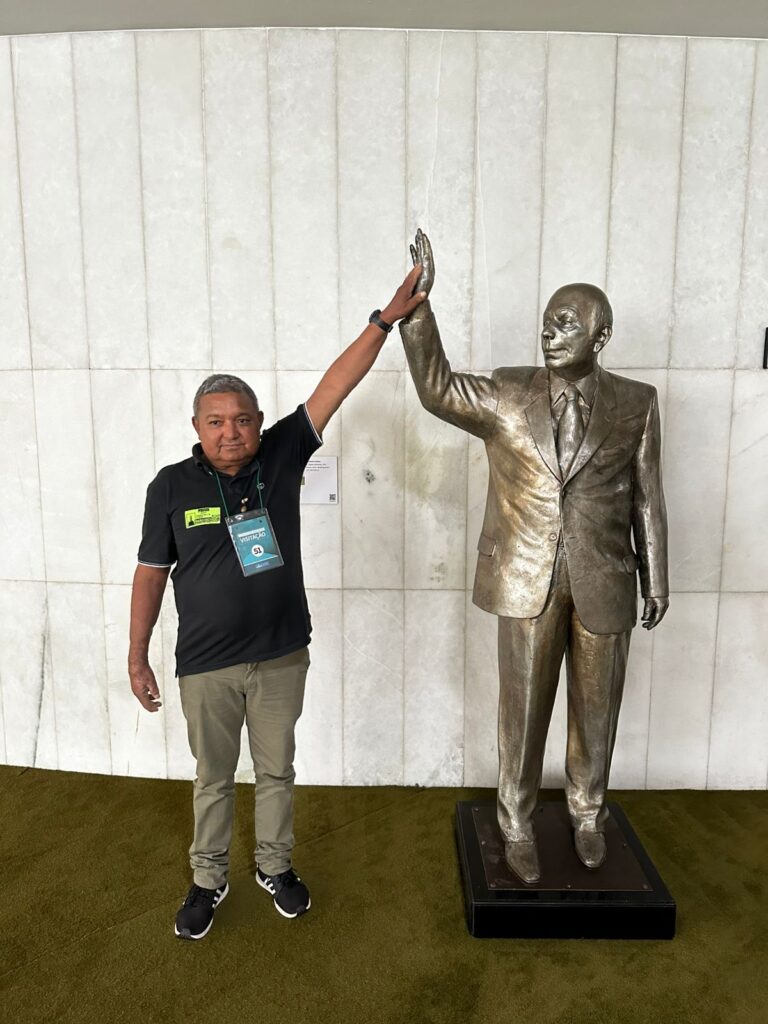
On the second day, a training session led by partners Sapopema and TNC (Society for Environmental Research and Protection and The Nature Conservancy Brazil) focused on Gender and Water-Related Rights, reinforcing the need to include gender perspectives in public policies and fisheries management practices.
The third day centered on political advocacy. Managers, scientists, and fisheries authorities participated in a roundtable discussion where fishermen presented their demands and proposals. Guests included representatives from the Ministries of Fisheries and Aquaculture (MPA) and the Environment and Climate Change (MMA), as well as researchers from federal universities and leaders of fishing-related associations and collectives. Instituto Juruá played an active role in these discussions, presenting concrete demands and emphasizing participatory management as a key tool for conservation and sustainable development.

Exploring Centers of Power
On the final day, participants visited key sites in Brasília, including the headquarters of the Ministry of Fisheries and the National Congress. This educational activity allowed fishermen from remote Amazonian regions to see where decisions affecting their lives are made. For the Instituto Juruá representatives, the visit was a valuable opportunity to connect with policymakers and reflect on the importance of political engagement in defending the rights of traditional communities.
Seu Preto reflected on his experience:
“I visited a beautiful and wonderful city. I am bringing back to my community a model of Brasília and an understanding of where our current president and ministries are located—places that should be part of our budget discussions. We need to strengthen our base. I learned a lot, and I am sure Instituto Juruá will be an important partner in helping us strengthen our communities.”
A Call to Action
Dialogues of Knowledge reinforced the importance of uniting traditional communities, scientists, and public managers to defend fishing territories and traditional ways of life. The Brasília Charter, born from this gathering, is an urgent call for the Brazilian government to take concrete steps in ensuring rights and protecting water peoples.
By actively participating in the event, Instituto Juruá reaffirmed its commitment to Amazonian biodiversity conservation and the empowerment of traditional communities. As fishing communities continue to resist, events like this demonstrate that the union of knowledge and collective mobilization are powerful tools in the fight for socio-environmental and territorial justice. The Amazon, with its immense biodiversity and cultural richness, deserves and needs public policies that respect and value its traditional guardians.

